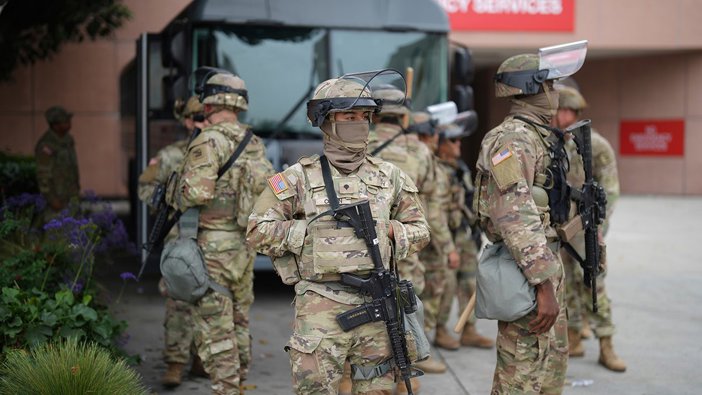
GOP Bill Expands Trump’s National Guard Power
GOP bill seeks to let Trump deploy National Guard for immigration enforcement when states refuse to cooperate.
Bill Proposes Federalized Guard Authority Amid Sanctuary City Tensions
Republican lawmakers have introduced the GUARD Act, a new bill aimed at codifying the president’s authority to deploy the National Guard for immigration enforcement—even over objections from state leaders. The legislation, championed by Rep. Pat Harrigan, R-N.C., comes in response to recent violent protests in Los Angeles following Immigration and Customs Enforcement (ICE) raids and is designed to address frustrations with so-called "sanctuary" jurisdictions that limit cooperation with federal agencies.
Under current law, the Posse Comitatus Act restricts the use of federal military forces in domestic law enforcement. However, the GUARD Act would establish a narrowly tailored exception, authorizing the president to federalize and deploy National Guard units for the express purpose of enforcing federal immigration law. This includes detaining individuals in the U.S. unlawfully, executing removal orders, and supporting border security operations.
The act also introduces new penalties for violence against immigration officers. It stipulates that individuals convicted of killing an immigration officer would face the death penalty or life imprisonment. Assaults resulting in bodily injury would carry a minimum sentence of 10 years, while any assault would mean at least five years in prison. These provisions mirror protections already afforded to other federal law enforcement officers but offer explicit coverage for immigration enforcement personnel.
Sanctuary Policies and Presidential Authority
The legislative proposal follows a period of escalating conflict between the federal government and states such as California, where Governor Gavin Newsom refused to cooperate with federal enforcement. After riots broke out in Los Angeles during an ICE operation, President Trump deployed the National Guard and later U.S. Marines to restore order. While California challenged the deployment in court, the judiciary has thus far upheld Trump’s authority to maintain federal control over the Guard.
“The GUARD Act makes one thing clear: When state and local leaders refuse to enforce federal immigration law, the President has the authority—and the responsibility—to act,” Rep. Harrigan said. He argued that sanctuary policies have turned cities into “safe havens for violent criminals” and stressed that the bill is necessary to ensure public safety even when governors block deployments that protect communities.
The bill’s supporters believe it would resolve uncertainty about the president’s powers in similar situations nationwide. Its critics, however, warn that it could set a precedent for expanded federal intervention in state affairs and raise questions about the appropriate use of military resources in civilian law enforcement.
As the GUARD Act advances in Congress, the debate is expected to focus on the balance of state and federal authority, the rights of immigrants, and the broader implications for American governance in times of conflict over immigration policy.






